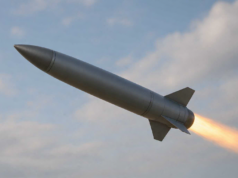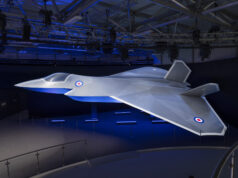Rolls-Royce say they have completed testing of the “ground-breaking technology” that will power the world’s fastest all-electric aircraft.
The ‘ionBird’ test aircraft will be used to hit speeds of over 300 mph.
All the technology has been tested on a full-scale replica of the aircraft’s core, called an ‘ionBird’, including a 500hp electric powertrain powerful enough to set world speed records and a battery with enough energy to supply 250 homes.

“The plane is part of a Rolls-Royce initiative called ACCEL, short for ‘Accelerating the Electrification of Flight’. Our ACCEL project team includes key partners YASA, the electric motor and controller manufacturer, and aviation start-up Electroflight. The team has been developing the technology while adhering to the UK Government’s social distancing and other health guidelines and the systems will soon be integrated into our ‘Spirit of Innovation’ plane. There is a long history of iron-birds in aviation for testing propulsion systems ahead of flight, but in this case we have named the test airframe ‘ionBird’, after the zero-emission energy source propelling the aircraft.”

UK Business and Industry Minister Nadhim Zahawi said:
“From trains to planes, our transport of the future will be powered by clean, electric sources – with companies like Rolls-Royce developing the tech to help meet our net zero ambitions. The completion of ground-testing for the government-backed ACCEL project is not only a step towards an exciting world record attempt, but a leap towards developing all-electric and hybrid-electric planes that one day could ferry large numbers of passengers around the world.”
The firm say that the first flight is planned for later this year and that they are aiming to beat the current all-electric flight world record early next year. Half of the project’s funding is provided by the Aerospace Technology Institute (ATI), in partnership with the Department for Business, Energy & Industrial Strategy and Innovate UK.













How long does it take to recharge the batteries I wonder?
There is so much work going on on battery technology I doubt that they care. They merely want to be ready when light fast charging hi capacity batteries are available.
It isn’t the battery that is the problem, though always subject to improvement, but the ability of the grid to connect and sustain the energy transfer rate! High charging rates require very heavy duty connectors and cables. They also didn’t quote the flight endurance, which is perhaps telling. Not to say that such developments shouldn’t be looked into. As with cars it isn’t the vehicle that is the limiing factor but the supporting energy infrastructure.
Actually that is not necessarily true. The energy could be stored in other batteries or capacitors that charge more slowly and these then charge the aircraft battery rapidly. Plus the Grid is pretty resilient and is not going to suddenly fall over when someone plugs in their plane. Also by the time these things are common the grid will have evolved to cope.
The issue we all have with batteries is our assumption that their existing limitations will persist to some degree or another.
Perhaps the capacity issue will be resolved so that re-charging from the grid is not an issue. Perhaps … perhaps …perhaps
The biggest issue is we know that huge strides will be made in the technology what is slowing everything down is understanding what those strides will be and consequently what impact that will have.
charging from the grid is currently not a particular issue for cars anyway, Obviously for large aircraft there are challenges to overcome but there are solutions already available. Battery energy density is the only real problem we currently have for aircraft and we need this tech to get better in order to make large battery electric aircraft a reality. There are technologies coming along that could indeed help with that, for instance there are a number of battery technologies that can increase energy density by up to 5 times which will solve most of the issues. Those technologies also enable faster recharging too as an added bonus. So yes the future looks good in this respect and experiments like Rolls Royce are doing here are only increasing our understanding and accelerating the developments.
You are correct about the grid. The tech is there too for hyper charging, it’s uust that no one wants it or to pay for it yet
Yes, the latest advance is the inclusion of a graphene layer in between the lithium. This has a number of major benefits. Firstly, it nearly halves the charging time over a conventional Lithium Ion battery, secondly, it helps push up the energy density and thirdly it significantly prevents the battery from overheating during high loads or when charging. It also helps to prevent the battery shorting out internally making them safer to use, especially if it gets penetrated.
“and a battery with enough energy to supply 250 homes”. What! per unit time? 250 homes for 1 second or 10 hours? doesn’t mean much to me. Can someone explain?
looking on the web and found the average house produces 28.9 kWh so are they saying they have a battery capable of delivering 7225 kWh?
Actually the figures I found say around 10kwh per day so that would be a 2500 kwh battery. Still sounds huge and not correct…
Just found the info. It has 3 72kWh batteries. I wonder if they mean for the duration of the flight it would power 250 homes?
However that is still a significant amount of battery power.
So that is the equivalent of 3 cars, which take 3 hours to reach 80% charge from flat on a high speed charger. Typical houses are fused at 60A which equates to up to 15KWh or for 250 is 3.75MWh. 500hp is approx 375KW, so if it has 3 of 72KWH batteries that means it has a potential endurance at full power of around 35 minutes, before needing 3 hours of charging from a car type fast charger. Charging faster than this requires much higher currents and voltages so the physical interconnection issues are significant. (Back of the envelope calculations, and spookily 375 seems to be a repeated figure!) This battery needs a single biggish wind turbine for a few hours just for itself! It all suggests that the concept, worthwhile to explore, is not viable. Batteries just do not have anything like the power density of hydrocarbon fuels, and especially comparing weight for weight.
The plane is developed to go fast not to go far…
Batteries do not need as much energy density as fossil fuels they need better energy density than they currently have (although that will get much better as we move forward). A battery aircraft is more efficient so does not need the same energy to go the same distance as a fossil fuel aircraft. Also a battery does not take 3 hours to charge to 80% on a high speed charger. In fact the porsche taycan can charge to 80% in 15 mins… (93kWh battery).
Whatever a journey is it will require a certain amount of energy. Batteries have an extremely long way to go before they can match energy density compared to hydrocarbon, but it is horses for courses. Fast and short or long and slow. Efficiency is highly questionable and it is necessary to compare like with like. In theory EVs are more energy efficient than IC but it is necessary to consider the whle system including generation and distribution against battery life (including charging cycles) and mass. A typical car will have a battery pack weighing around half a tonne, against equivalent mass of liquid fuels of around 50 to 60kg for similar amounts of stored energy. The Porsche does not use the standard high speed street charger for that rate of transfer. Your figures imply 400KW per hour which means (ignoring the AC power factor effects) over 900A at 440V. Typically a car will charge to app 80% in about an hour, the example was based on the 3 ‘cars’ from the preceding letter. This requires 3 chargers so from a single charger it would take 3 hours for all 3. I’m not arguing against the concept, but that the grid and generating capacity coupled with the outlet connectors and charging point controls needs far far more development and installations to cope with even current demand never mind that in a few years time. The focus at the moment is far too much on the vehicles and batteries. The energy has to be generated and distributed in a usable and bulk form for EVs to even remotely replace hydrocarbon IC engines in the foreseeable future. What use are EVs for mass transport (aircraft or land) if they cannot be practically re’fueled’? No more 5 litre fuel cans for when you run out!
Well my car is an old EV now and has a small battery in comparison to any currently available model (I have had it 4 years now). I have no real issues but it does restrict my choices of how I make a journey. A range of around 300 miles is all that is needed to make these issues go away. You should not really be driving any more than 200 miles in one go as that is pretty dangerous but the 300 miles give you choices on where and when you charge on a long journey. Oh and that 80% in an hour depends on the battery size and electric system. Mine takes 25-30 mins to get to 80% But that is from zero charge which never happens. So most of the time I charge to 80% in about 15-20 mins. Larger batteries take longer to charge obviously, however if you charge them for 30 mins you get the same (actually a bit more) range than I get in the same time. Most people will not need to fully recharge their battery to make a journey if they have 300 mile range. And to be honest most people will stop on long journeys for toilet and food breaks etc so you are charging while you are doing those things. After 4 years of making long family trips, I can tell you that there is not problem.
As for efficiency BEVs are massively more efficient than ICE cars. for instance a petrol car is at best 20% efficient over a full cycle while a BEV is around 90% efficient. Now there are other inefficiencies in the system but that is true of both EVs and ICE. the amount of energy required to find, extract and process petrol is huge not to mention the distribution. Certainly there are less inefficiencies in the Electric system than used in the petrol production process…
As for the energy needed to go a certain distance, Yes there is a particular energy needed to travel a given distance. Then inefficiencies increase this energy requirement. Turbofans are around 60% efficient at cruise and far less so at takeoff and taxi movements. That means they need more energy to do the same flight as an electric aircraft would. So an Electric aircraft does not need to have the same energy density as petrol in order to be equivalent. It does however need more energy density than we currently have available but this is going to change.
Interesting but how do 20 or 30 vehicles per hour get charged from two or three outlets, sometimes only one? That is the problem not the actual range or style of vehicle. And getting that energy to the outlets in the first place? Not arguing about efficiency but looking at the energy requirements and how to get that energy into the vehicles in the first place. That is just cars, what about commercial vehicles? And what happens if the battery goes flat on a journey or in a field or moorland?
National Grid did research into this and found that if everyone in the UK changed to EVs overnight we would need just a 10% increase in capacity. That is not a lot in the grand scheme of things and given the length of time it will take to get everyone to that point it is something that can be done over many years.
Charging infrastructure is a different thing. We need the Government to put money into this in order to get more charging available. Given that around 50,000 people die per year from pollution in the UK I don’t think that is a lot to ask.
However Longer range batteries will help a great deal as with a range of 300+ miles people will not need to charge as often and therefore this takes the pressure off the charging infrastructure a bit. I use my car a lot and I do not need to use mid route charging very often. I charge at home and at destinations and it is only on longer trips that I need to use mid route charging.
If your battery goes flat in the middle of nowhere then you can call the AA, RAC etc who will either tow you to a charger (given that you can plug in at a standard 3 pin socket that is not a critical issue) or they will charge your car from onboard batteries some of their vehicles now have. I have never run out of fuel in the 22 years I have been driven petrol cars and I have never run out of battery power in the 4 years owning an EV. It is not a particular problem that the vast majority have to worry about. Given that one of the benefits of an EV is less chance of breaking down I think it is a non issue.
Most of the people that raise issues with EVs have never driven one and obviously not spoken with people that own and drive them every day. Both of our cars are now EVs and we could not be happier, and given that we go on lots of trips out into the countryside for walks, camping etc I can tell you that there is no major issue. Could things be better? Yes, Most of the chargers need apps in order to work for some stupid reason but that is changing and there are already the excellent Instavolt chargers that just require a debit card to be tapped on them and as far as I am aware the others have to change to that system within the next year or so. Also we clearly need more chargers as more people buy EVs but that is also getting better as they get put into petrol stations and hotels etc. However I could never go back to the loud, clunky petrol car. I had to drive my wifes for an hour to pick up her new EV and it was hell… EVs drive nicer, are fast, well balanced and I get to switch its heating on in the winter from my phone so I never have to scrape the windows and get into a cold car ever again…
I’m dubious that the Porsche really recharged that fast all the way and if it does the number of charge cycles it supports before the battery takes a hit.
That might be peak charge rate? Or average charge rate?
I’ve got a Tesla with a 100kWhr battery and whilst it does take 200kW at the start of the charge this drops off to about 100kW at 40% and slows all the way from there.
The limitation is deliberate to increase charge cycles.
that being said the number of times I ever supercharge it is very low. Generally I go where I need to and put it on a 22kW charger, 3 phase 32A now reasonably common, and leave it for a few hours and it will be pretty much charged up.
It absolutely does. I did not mention the charge rate, just that it takes 15 mins to get to 80%. It uses an 800v system compared to teslas 400v system. The main issue with charging is heat rather than speed. If you can keep the battery cool during the charge (something Teslas are also pretty good at) then it does not damage the battery anymore than a slow charge. However you are correct that charging speed drops off as the battery reaches full capacity as this also can damage the battery. The Porsche is no exception to that but it still charges very rapidly as long as you can find a 350kW charger.
Interesting.
Yes the Tesla does precondition the battery when you are navigating to the supercharger to get it to optimum temp and then you hear the air conditioning running which is the limiting factor I would guess.
Plenty of Tesla 150kW and 250kW chargers about at service stations!
Yep, there are however only a handful of 350kW chargers in the UK so far as only the porsche can use them fully. They have liquid cooled cables… There are other porsche group cars that will use the 800v system but they will be things like Audi sports cars etc. The more normal cars are still using the 400v system.
FYI The Tesla 250kW also uses liquid cooled cables p.
Ah, I didn’t know that. I suppose it would given the current.
Basically you are right, the statement needs to state the length of time or is meaningless.
The trouble is few seem to understand the difference between energy and power and in common usage the two are often interchangeable. As an engineer it drives me nuts, especially has it is pretty simple and fundemental to how the world, both technologically and naturally, works.
Simply put power is the rate at which energy is delivered. The faster energy is delivered the quicker a job gets done, which is why petrol heads talk power because they get to go fast! However, energy can be just as important as it relates to the ability to get the job done. No good delivering all the energy quickly if it means you do not actually finish the job or journey.
Hope that helps and sorry if I was teaching granny (or grandpa) to suck eggs.
Cheers CR
Exactly! The engineering involved in getting the energy into the vehicle is the problem!
Hi Nscnick…Not my subject I’m afraid…but is Hydrogen possibility
Hydrogen might be a solution for some forms of transport (ships for instance) but it is not great at the moment as 90% of it is steam reformed from methane so it is essentially a fossil fuel. It is also bulky as it requires a pressure tank for storage and even then hydrogen does not have the same energy by volume as petrol. Hydrogen cars also need batteries as the fuel cells can only react slowly to changes in demand and also can not store breaking energy. Fuel cells are only 60% efficient (far better than petrol engines but far from the same efficiency as Battery electric and this is made worse by the fact it then loses efficiency through the battery system it has to go through. You might as well simply charge the battery directly from the grid as it you can power 2 battery electric cars for the same energy as 1 hydrogen powered car.
Hydrogen may be a great answer to storing excess energy from renewables though as in times of low demand and high generation the electricity can be used to produce hydrogen from water and then store it ready to be passed back through a fuel cell to generate electricity again. Because the energy would have been wasted anyway, it does not matter that the efficiency is not great.
For aircraft it is also not normally seen as a great solution as aircraft tend to store their energy in the wings, underbelly etc While hydrogen aircraft need to store the fuel in large pressure tanks in the fuselage which is normally where fee paying passengers need to be… Airbus are looking into it but I am not sure what they plan on doing about this issue. Perhaps they think that the cheaper fuel costs will make up for the reduced passenger capacity?
Thanks for that informative reply
in the long term, maybe solar panels to recharge whilst cruising at height in flight?
Solar panels will have to become much more efficient for them to make a significant difference. Although for long range flights they could indeed help.
Not just much much much more efficient but produce far more energy per sq metre as well. EVs are the way to go but there is an awful lot of things to be done before they can practically replace IC hydrocarbon. I’d love to but they don’t even remotely do any of the tasks I need apart from going shopping once a week.
What task do you need your car to perform?
Th real limiting factor in all this rush to EV is the availability of cobalt, it is a finite resource and not enough exists to replace ICE , at some point it will come down to the little man not being able to have personal transport so the big man can have an EV aircraft
Can’t come soon enough. Great progress is being made.